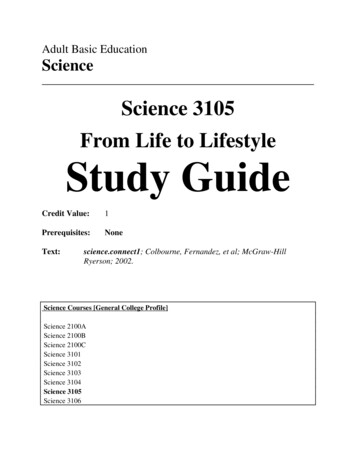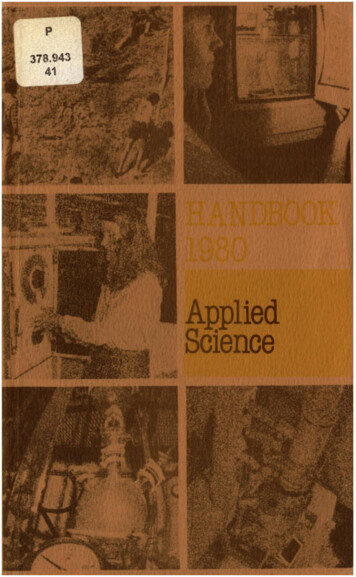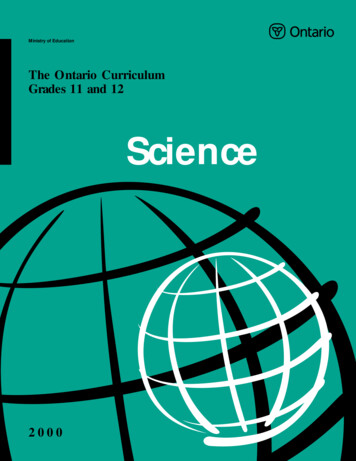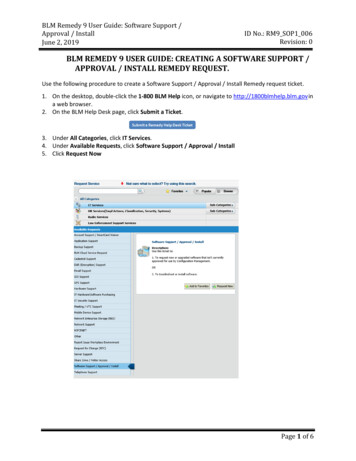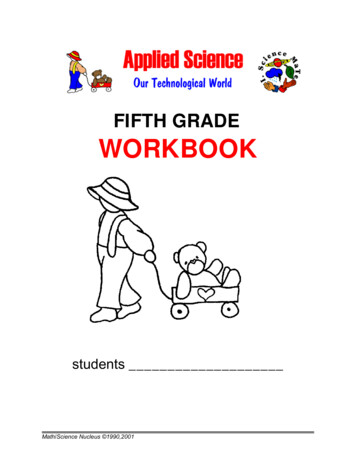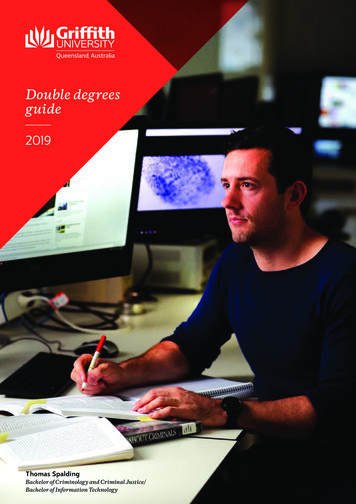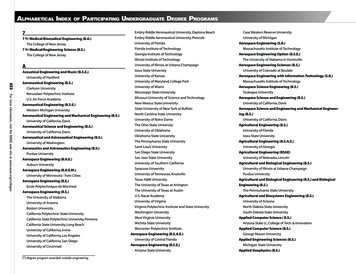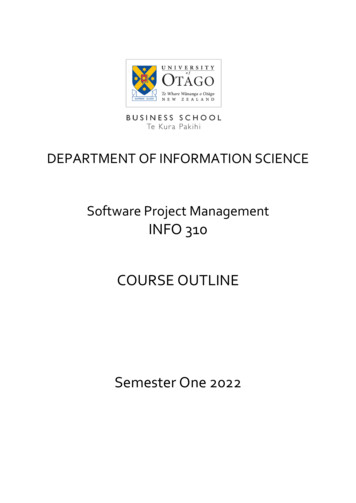
Transcription
DEPARTMENT OF INFORMATION SCIENCESoftware Project ManagementINFO 310COURSE OUTLINESemester One 2022
ContentsPaper Description and Aims . 1Learning Outcomes . 1Teaching Staff . 1Course Delivery . 1Expectations and Workload . 3Course Learning Resources . 3Blackboard . 3Student Webmail . 3Assessment. 4Description of Assessments . 4Course Requirements . 5Quality Assurance . 5Grading System . 6Academic Integrity and Academic Misconduct (Plagiarism) . 6Course Calendar. 6Student Learning Support and Information . 8Student Charter . 8Guidelines for Learning at Otago . 8Student Learning Centre . 8Library Support . 8Kaiāwhina (Māori Student Support) . 8Pacific Support . 9Disability Information and Support . 9Student Feedback . 10Class Representatives . 10Concerns about the Course . 10Disclaimer .11
Paper Description and AimsThis course introduces multiple aspects of software projects, including software life-cycle models,software requirements, software effort estimation, software project scheduling and prioritisation,and risk and issue management. Other topics include project organisation and teamwork, softwareconfiguration management, software quality management, managing software contracts andmanaging release and implementation.Learning OutcomesUpon successful completion of this paper, you should have: The ability to delineate software requirement and come up with a project schedule and assignresources Knowledge of appropriate software development methodologies (e.g., Waterfall andSCRUM) The ability to identify project risks, and the ability to monitor and track project deadlines The skill to work in a team environment, and understand the importance of human factorsand different modes of communication The skill to creatively design software applications Examined the principles around software quality and contract management, and be aware ofsoftware release and implementation considerationsTeaching StaffPaper CoordinatorName:Dr. Daniel Alencar da fice Hours: Please e-mail to book an appointmentLecturerName:Office:Email:Office Hours:Dr. Sherlock LicorishOBS 3.41sherlock.licorish@otago.ac.nzPlease e-mail to book an appointmentYou should contact Dr. Daniel Alencar da Costa with any administrative enquiries about the paper,e.g. absence.Course DeliveryLecture Day/Time: Wednesdays, 2:00 pm – 3:50pmTutorials and/or Labs Day/Time: Thursdays, 11:00 am – 12:50pmRoom: Will be available in eVisionPage1
Online lectures present the key conceptual material through discussion and interaction betweenteaching staff and students. Lectures are supported by readings. In case of Red Alert, Lectures willbe delivered via on-line recordings.In person Tutorials/Labs are collaborative sessions in which student groups attempt to cementconcepts presented at lectures with their peers in a supportive environment. The tutorials/labs willalso be used to progress the software project implementation and ask questions about the lectures.Tutorials/Labs begin in the first week of semester. You will be allocated to a tutorial and this will beavailable in eVision. Tutorial times and locations will be posted on Blackboard during the first weekof lectures. Tutorials/Labs are likely to remain in-loco at Red Alert.Course Calendar The course calendar (in this outline) details scheduling information. Note that thiscalendar may change as the course proceeds. Any changes will be announced via blackboardannouncements and be detailed on Blackboard.Students are expected to prepare for and watch all classes to gain full benefit from the courseThese activities should be prepared for by reviewing information detailed on Blackboard andcompleting any assigned readings. Students unable to attend a lecture are expected to catch up onmissed material. Unless stated otherwise, all aspects of the course are examinable.Page2
Expectations and WorkloadOne lecture per week ( 2 hours)One tutorial/lab per week (1 hour)Independent study/work each week (assumed to be 6 hours)Course Learning ResourcesThe recommended readings for this paper are the following: Software Project Management (5th ed.), by Bob Hughes and Mike Cotterell, McGraw-Hill,(2009). Object Oriented Software Engineering – using UML, Patterns, and Java (3rd ed.), by BerndBruegge and Allen H. Dutoit, Prentice Hall, (2010). Software Engineering (10th ed.), by Ian Sommerville, Addison Wesley, (2015). Continuous Integration, by Paul M. Duvall, Steve Matyas and Andrew Glover (2007) Continuous Delivery, by Jez Humble and David Farley (2011)BlackboardBlackboard https://blackboard.otago.ac.nz/ provides you with access to course materials, classnotices, and resources. Blackboard is used to email the whole class, so it is important that you checkyour student email and Blackboard regularly.Student WebmailIMPORTANT - DO THIS NOW:Forward your University email address to an email address that you use regularly as follows:1. Log into your StudentMail account using your student username and password2. Click Cog button (top right corner) Options3. Under Account, select the Forward your email shortcut under the Short Cuts menu on theright side of the screen.4. Under the Forwarding heading, type in the email address you want your email to be forwardedto. You can also choose to have a copy of these emails kept on your StudentMail account, soplease check the box if you would like this.5. Click the Start forwarding button.Page3
AssessmentAll material presented is examinable (except where stated otherwise) by assignments and the finalexamination. All-important assessment information such as due dates and times, content, guidelinesand so on will be discussed at lectures and, where appropriate, detailed on Blackboard. Students areresponsible for ensuring that they are aware of this information, keeping track of their ownprogress, and catching up on any missed material.AssessmentDue date% offinal grade1015(5 each)Overall quality of the project developmentContinuousSoftware MilestonesWeek 4, Thursday Mar 24th- Software requirements, estimations,Week 7, Thursday Apr 21stand modelsWeek 9, Thursday May 5th- Database connection and operations- Key functionalitiesSoftware Deliverable (including presentation) Week 12, Friday May 27th at 5pm20Team Evaluation QuestionnaireWeek 12, Friday May 27th at 5pm5Final ExamTBC50Requirements to pass the paper- A minimum of 40% of the Final Exam marks is required to pass the paper.- The exam will have 100 marks, meaning that students will need to obtain at least 40marks to pass the paper.Description of AssessmentsOverall quality of the project: this is a continuous assessment that covers all the quality aspectsemployed in the implementation and progress of the software project. Examples of good indicatorsfor the quality of the software project are:- The software project consistently uses automated tests throughout the project lifetime (i.e.,not only at the end of the project)- The software project uses continuous integration, which includes:o Automated buildso Frequent commits to the main repository- The software project contains a reasonable number of code comments- And any other quality aspect taught in classes.Software project milestones: there are three main important events in the software project, whichare called milestones. These milestones are intended to make sure that students are progressing wellwith their software project. The first milestone (Software requirements, estimations, and models) isset to ensure that the team has a solid plan on what needs to be developed. The second milestone(Database connection and operations) is set to ensure that the team implements one of the mostimportant steps in software development: the communication between software and a database.Lastly, the third milestone (Key functionalities) is intended to ensure that the teams implement themost important functionalities of the software (i.e., a minimum viable product). If a team achieves asolid third milestone, this is a strong indicator that the Software Deliverable will be successful. Foreach milestone, the development team will give oral presentations during labs/tutorials (see thecourse schedule for more details). The specific instructions regarding oral presentations will beprovided via blackboard.Page4
Software Deliverable (class project): Students (in groups) will develop a simple software solution toa common problem. The software deliverable will be assessed for 20% of the course mark (includingpresentation), and is due in Week 12, Friday May 28th at 5pm. The software will reflect the work oftwo to three sprints of development (iterations). As part of the deliverable, students will provide apackaged piece of software with appropriate setup instructions. Students will also present theirsoftware during a 15 to 20 minutes oral presentation. The mark will take into consideration the levelof functionality provided, and the quality, robustness and usability of the software.Team Evaluation Questionnaire: Each student will complete a team (group) evaluationquestionnaire during Week 12 that is worth 5% of the course mark. Student will be required toperform self-assessment and evaluate the performance of each member in their team. Staffmembers will also complete the questionnaire for each student, based on their observations duringthe course. Only students that complete the questionnaire will be eligible for these marks. Note alsothat the outcomes of the questionnaire could result in the revision (increase/decrease) of themarks you receive for the Milestones and Software Deliverable (class project).Final Exam: The final exam is held by the registry which is 3 hours long and worth 50% of the coursemark. It will contain questions from material covered in the lectures, tutorial/labs and experiencesfrom the project. Students are required to obtain at least 40% of the exam marks to pass the paper.Course RequirementsAssessment Format:Further instructions will be provided at the start of the course, including assessment descriptorsspecifying formatting instructions.Assignment Submission Procedure:Students are to follow submission instructions given in the assignment descriptors.Late Assignments:All requests for special consideration for internal assessments must be made as early as possible tothe course coordinator and will be dealt with on a case-by-case basis. Should you be unable to attendor complete any internal assessment component for medical or personal reasons, appropriatedocumentary evidence (such as a medical certificate) is required. Requests and associateddocumentation must be provided as early as possible so that alternate arrangements can be made.Any late requests are likely to be turned down. Students who wish to apply for specialconsideration for the final examination should contact the Registry.Referencing Style and Style Guide:For this paper the referencing style is APA; refer to style guide:(http://otago.libguides.com/ld.php?content id 23289095& ga 1.15196726.1422781749.1469081771)Quality AssurancePage5
At the Otago Business School we monitor the quality of student learning and your learningexperience. Your assessed work may be used for assurance of learning processes, such as evaluatingthe level of achievement of learning outcomes, with the aim of improving the quality of ourprogrammes. All material used for quality assurance purposes will be treated as confidential and theoutcome will not affect your grades.Grading SystemThe grading scheme used at Otago is:A AAB BB-90-10085-8980-8475-7970-7465-69C CCDE60-6455-5950-5440-49 40Results for all internal assessments will be provided electronically through Blackboard or via youruniversity email. If there are any errors or omissions regarding these, you must contact the coursecoordinator as soon as possible.Academic Integrity and Academic Misconduct (Plagiarism)Students should ensure that all submitted work is their own. Plagiarism is a form of academicmisconduct (cheating). It is defined as copying or paraphrasing another’s work and presenting it asone’s own. Any student found responsible for academic misconduct in any piece of work submittedfor assessment shall be subject to the University’s dishonest practice regulations, which may result inserious penalties, including forfeiture of marks for the piece of work submitted, a zero grade for thepaper, or in extreme cases, exclusion from the University. The University of Otago reserves the rightto use plagiarism detection tools.Students are advised to inform themselves about University policies concerning dishonest practiceand take up opportunities to improve their academic and information literacy. If necessary, seekadvice from academic staff, or the Student Learning Centre. The guideline for students is available atthis link: ex.htmlCourse 1TopicReadingCourse Introduction and T1, Chapter 1Introduction toT3, Chapter 1Software ProjectManagementPage6Milestone(s)groups formed andprojects presentedduring lecture andtutorial/lab,assessment structureand grading discussed
7-MarSoftware RequirementsT2, Chapter 4T3, Chapter 414-MarTraditional and AgileSoftware DevelopmentModelsT1, Chapter 4T3, Chapter 321-MarSoftware EffortEstimationT1, Chapter 5T3, Chapter 2328-MarProject SchedulingT1, Chapter 6T3, Chapter 232345Teams finalised anddecompose softwarerequirements for classprojectSetting up the releaseenvironment usingcontinuousintegrationSoftware projectmilestone 1:requirements andeffort estimation andmodelsPlan the projectschedule to kickstartthe developmentMid-Semester Break from 4-Apr to 8-Apr11-AprSoftware ConfigurationManagement andContinuous IntegrationT2, Chapter 13T4, T5Introducing Testdriven development(TDD)18-AprManaging Quality andSoftware TestingT1, Chapter 12T2, Chapter 1125-AprRisk ManagementT1, Chapter 7T3, Chapter 222-MayManaging People andTeamworkT2, Chapter 3T3, Chapter 229-MayManaging ContractsT1, Chapter 1016-MayManaging Release andImplementationSoftware PresentationsT2, Chapter 13Software projectmilestone 2:Connecting to thedatabase andimportant operationsPlanning for Risks,Managing Quality,and consideringCommunicationdecisionsSoftware projectmilestone 3:Key functionalitiesManaging people,teamwork, andcontracts (reflections)Catching up on projectprogressProject (software)Deliverable and TeamEvaluationQuestionnaire dueCourse Feedback andReflections6789101123-May-121330-MayRevision and Final Exam All LecturesPreparation[T1] Software Project Management (5th ed.)[T2] Object Oriented Software Engineering – using UML, Patterns, and Java (3rd ed.)[T3] Software Engineering (10th ed.)[T4] Continuous Delivery, Jez Humble and David FarleyPage7
[T5] Continuous Integration, Paul M. Duvall et. al. Lectures end Friday 3th June 2022University Exam Period First Semester Begins Wednesday 8th June 2022End Wednesday 22nd June 2022Student Learning Support and InformationStudent mlGuidelines for Learning at otago.ac.nz/hedc/learning/Student Learning CentreThe Student Learning Centre, which is part of the Higher Education Development Centre, provideslearning support, free of charge, to ALL enrolled students. Their services include: a workshop programme designed to help students to improve their learning strategies and theirgeneric skills; individual assistance with learning issues; on-line study skills advice; a student leadership programme a student-led peer support programme for students of all ages and backgrounds. conversational English groups for students from a non-English speaking backgroundThe Centre also provides two very helpful study guides, “Guidelines for Writing and Editing” and“Writing University Assignments” and these are available on the SLC website.http://slc.otago.ac.nz/Library SupportThe Library website http://www.otago.ac.nz/library provides access to resources and services,including group room bookings, library hours and locations, past exam papers, subject guides, articledatabases and more.If you need assistance either check out the self-help guides http://otago.libguides.com/selfhelp, orask Library staff at the ground floor service desks, or email ask.library@otago.ac.nzKaiāwhina (Māori Student Support)Kia ora e te whānau!My name is Shay Edwards, and I am introducing myself as your Kaiāwhina Māori (student support)for Te Kura Pākihi, Otago Business School. I am looking forward to meeting you throughout the year.I am from the far North, in a beautiful coastal town called Whatuwhiwhi. I also grew up in TāmakiMakarau in a suburb called Te Atatu. I am super passionate about immersing Te Ao Māori & Te ReoPage8
Māori in digital spaces and am involved in two Māori e-sports platforms, Ngāti Gaming and VictoryUpNZ.My role is to support tauira Māori succeed while they are at Te Kura Pakihi. I can help with: academic studies, including tutoring and mentoring, particularly through Te HukaMātauraka (the Māori Centre) access to funding and scholarships pastoral care, personal support and leadership development options for jobs, internships and future pathways, including post-graduate study Tauira Māori feeling heard and safeI will be reaching out to students over the year but feel free to contact me if you have any questions,feedback or concerns. Please don’t be whakamā (shy).Office Hours 10am - 12pm: Mon, Wed, FriTe Maea, Room 6.13, 6th floorTe Kura Pākihi Otago Business SchoolPacific SupportMalo e leleiFalaviena Faiva works part-time in the Dean’s Office at the Otago Business School, Division ofCommerce. She is of Tongan descent and is one of the Pacific Student Support Facilitator’sresponsible for all first-year Pacific students in the division.Falaviena is a University of Otago, Humanities and Commerce graduate and is currently completinga Postgraduate Commerce degree in International Business.Deans Office, Otago Business SchoolDivision of CommerceEmail: viena.faiva@otago.ac.nzCell Phone: 021 279 0914Bula Vinaka.Jekope Ramala Maiono also works part time in the Dean’s Office at the Otago Business School,Division of Commerce. He is of Fijian descent and is the other Pacific Student Support Facilitatorresponsible for all second-year Pacific students in the division.Maiono is a University of Otago Commerce graduate, also studying a PHD degree in the Division ofHumanities.Deans Office, Otago Business SchoolDivision of CommerceEmail: jekope.maiono@otago.ac.nzCell Phone: 021 279 0871Disability Information and SupportPage9
Students are encouraged to seek support if they are having difficulty with their studies due todisability, temporary or permanent impairment, injury or chronic illness. It is important to seek helpearly, through one of the contacts below:Website: http://www.otago.ac.nz/disabilities65 Albany St, West Lane, ISB, Student ServicesTel: 64 3 479 8235 Email: disabilities@otago.ac.nzStudent FeedbackWe encourage your feedback. This can be in the form of contacting staff, participating in courseevaluation surveys and communicating with class representatives. Continual improvements will bemade to this course based in part on student feedback. Recent changes to this course as a result ofconstructive feedback include teaching the “Implementing proper Version Management and Trackingand Project Collaboration techniques’’ class earlier, since students felt this knowledge would be moreuseful if taught earlier in the paper.Class RepresentativesThe class (or student) representative system is an avenue for encouraging communication andconsultation between staff and students. It provides you with a vehicle for communicating your viewson the teaching and delivery of the paper and provides staff with an opportunity to communicateinformation and gain constructive feedback from students. It contributes to the development of asense of community within a department and it adds a further dimension to the range of supportservices offered to students.Volunteers for the role of class representatives will be called early in the semester. The OUSA invitesall class representatives to a training session, conducted by OUSA, about what it means to be a classrepresentative and some of the possible procedures for dealing with issues that arise. They alsoprovide information on the services that OUSA offers and the role OUSA can play in solving problemsthat may occur. The OUSA provides support to class representatives during the semester.Departmental staff will also meet with class representatives during the semester to discuss generalissues or matters they wish to have considered.Your class representative’s name and contact details will be posted on Blackboard early in thesemester.Concerns about the CourseWe hope you will feel comfortable coming to talk to us if you have a concern about the course. TheCourse Co-ordinator will be happy to discuss any concerns you may have. Alternatively, you canreport your concerns to the Class Representative who will follow up with departmental staff. If, aftermaking approaches via these channels, you do not feel that your concerns have been addressed,there are University channels that may aid resolution. For further advice or more information onthese, contact the departmental administrator or head of department.Page10
DisclaimerWhile every effort is made to ensure that the information contained in this document is accurate, itis subject to change. Changes will be notified in class and via Blackboard. Students are encouragedto check Blackboard regularly. It is the student’s responsibility to be informed.Page11
Continuous Integration, by Paul M. Duv all, Steve Matyas and Andrew Glover (2007) Continuous Delivery, by Jez Humble and David Farley (2011) Blackboard Blackboard. https://blackboard.otago.ac.nz/ provides you with access to course materials, class notices, and resources. Blackboard is used to email the whole class, so it is important that you check
